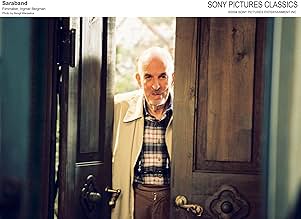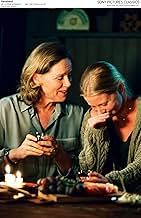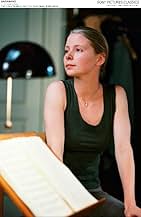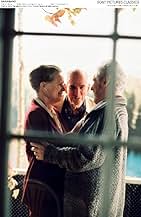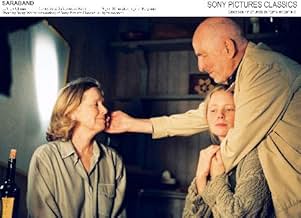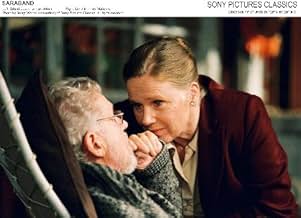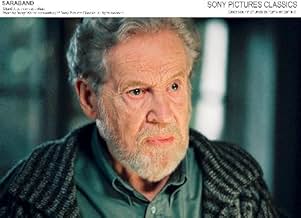Unos treinta años después de divorciarse de Johan, Marianne decide ir a la casa de verano de su exmarido para hacerle una visita. Al llegar, se encuentra en medio de un drama familiar entre ... Leer todoUnos treinta años después de divorciarse de Johan, Marianne decide ir a la casa de verano de su exmarido para hacerle una visita. Al llegar, se encuentra en medio de un drama familiar entre el hijo de Johan, de otro matrimonio, y su nieta.Unos treinta años después de divorciarse de Johan, Marianne decide ir a la casa de verano de su exmarido para hacerle una visita. Al llegar, se encuentra en medio de un drama familiar entre el hijo de Johan, de otro matrimonio, y su nieta.
- Premios
- 3 premios ganados y 3 nominaciones en total
- Dirección
- Guionista
- Todo el elenco y el equipo
- Producción, taquilla y más en IMDbPro
Opiniones destacadas
Now, over 30 years later, I am in my living room once more watching Johan and Marianne. Only this time I don't need subtitles, as I have since learnt Swedish. :-)
Bergman weaves a tale of vindictive dependence and of a young girl's decision to finally make her own way in life - despite some very powerful forces preventing such a move.
Marianne decides to seek out Johan, meets him and becomes involved in the tug of war over his grand-daughter's future with the girl's father, Johan's depressed son Henrik (wonderfully played by Börje Ahlstedt).
A quiet, intensive film. With an important, pivotal roll for the grand-daughter Karin played by Julia Dufvenius.
Bergman should be proud of this. It's a fine epilogue to a marvelous career in cinema and story-telling.
Bravo!
In his last work as a director, Ingmar Bergman revisits the characters of 1973 "Scenes from a Marriage" thirty years older, with Marianne sharing the dramatic and complicated relationship of John's family. The first point that impresses in this movie is the always precise and careful direction of an 83 years old Ingmar Bergman, showing an amazing vitality and longevity in his career. I do not recall the last movie I have seen of Liv Ulmann, but this now senior actress is still fantastic. This theatrical movie is a great character study, as usual in Bergman's films, with excellent and emotional dialogs, and ends with many open issues. Why Johan and Henrik hate each other so deeply? What was written in the last page of Anna's farewell letter? I believe she knew that her husband was having an incestuous relationship with Karin. The unknown actress Julia Dufvenious is extremely beautiful and talented, and her contradictory character is also impressive. My vote is eight.
Title (Brazil): "Saraband"
Having said that it seems a strange twist of fate to be viewing Saraband, as I did, at the Edinburgh International Film Festival where it is up for the Standard Life 'audience award', along with mainstream crowd-pleasers. As I cast my vote I felt it was almost a desecration for such a movie to be entered in a popularity poll, however discerning the audience. There are a number of serious works at the Festival and they should be judged by an independent panel of experts - there is a discussion afoot to create a new award along these lines - otherwise it is like comparing Beethoven with the Beatles.
Saraband, in true Bergman tradition, wrestles with human relationships, using a slow pace, pointed dialogue, and heavy use of symbolism to explore the psychological states of the characters. Bergman encourages young directors not to direct any film that does not have a "message," but to wait until one comes along that does, yet admits himself that he is not always sure of the message of some of his films.
We are never in any doubt that this film has much point to it, even if the point is not exactly clear. It opens with the slow soulful 'saraband', of Bach's 5th unaccompanied cello suite. 'Sarabande' is one of the movements from the suite, a slow and, compared to the others, a relatively easy piece to play. Marianne (Liv Ullman), is both narrator (at the beginning and end of the film) and principal protagonist. As she walks through the rooms of a house the doors close behind her. A cuckoo clock strikes. She is in the later part of her life. She fleetingly touches the keys of a piano, as if to say she still, even in solitude, has her inner music. Her presence is explained as she goes to the veranda and we find she is visiting an ex-husband, someone who was unfaithful to her many years ago. The colours are crisp and sharp. Of all the members of her family, Marianne is perhaps the clearest of mind and most well-balanced, but it is the extended interaction (with very little action) between the main players that give us insights into the beauty of being elderly, at least for someone like Marianne who handles it well. Yet even she is filled with sadness for others.
Later chapters of the film focus on her step-grand-daughter. Karin is a cellist, living with a rather overprotective (if that's not too mild a word) father, also a musician. She has to face a difficult choice, involving her personal loyalties, her loyalty to herself and ability as a gifted young cellist, and the need to extricate herself from a situation that is bad for her but will be bad for her father if she does.
The symbolism of the title and music neatly metaphors the decisions before her. A saraband is also a two-person dance. The suggestion, made at one point, of playing it by two people alternating is essentially a frivolous one, which serious musicians would probably reject. That the Suite for Unaccompanied Cello should not be played as a duet, even with the younger person playing the 'easier part' as Karin's father suggests, is an unobtrusive symbol reminding us, in the film's later loaded context, that there are some lines that an older and younger person should never cross together.
Saraband shows how old age can tempt us to wisdom or its opposite.
With an intolerable burden of the generations, a young woman must make a choice that may be tragic. There are no useful models, not even the briefly glimpsed folk-art carving of the Last Supper with John, the beloved disciple, blissful on the lap of Jesus, not law, Kierkegaard, whiskey, or Bach either.
It is regrettable if after all these years this is Bergman's "Tempest" (though then appropriately involving Erland Josephson--all the actors are necessarily extremely good). Shakespeare did go on to work on "The Two Noble Kinsman."
SVT could have given Bergman film instead of digital recording. RAI uses film for its splendid productions, or it used to. Seen in a theatre, the visual quality was imperfect. How could people think this work would not deserve general theatrical release?
¿Sabías que…?
- TriviaLast film project directed by Ingmar Bergman.
- ErroresThere are some interesting discrepancies in relation to the time line of the characters. The ages given for the characters are 63 (Marianne), 86 (Johan) and 61 (Henrik). Marianne says that she has not seen Johan for 32 years and that they had been married for 16 years. This means that she married Johan when she was 15 and he was 38. Johan had a falling out with his son when Henrik was 18/19, which must have been after Johan's marriage to Marianne.
- Citas
Henrik: Dad, where does all this hostility come from?
Johan: Speak for yourself. When you were 18 or 19, I tried to get close to you. You'd been seriously ill, and your mother wanted us to talk things out. I said to you, "I know I've been a bad father, and I want to do better." And you screamed at me--yes, screamed--"A bad father? You've never been a father at all!" Then you said you could do without my forced exertions. One should respect honest hatred, and I respect yours. But I really couldn't care less if you hate me. You barely exist. If it weren't for Karin, who thank God takes after her mother, you wouldn't exist for me at all. So there's no hostility here, I assure you.
- ConexionesFeatured in Bergman och filmen, Bergman och teatern, Bergman och Fårö (2004)
- Bandas sonorasCello Suite no. 5 in C Minor, Movement 4: Saraband
Composed by Johann Sebastian Bach
Performed by Torleif Thedeen (as Thorleif Thedeen)
Selecciones populares
- How long is Saraband?Con tecnología de Alexa
Detalles
- Fecha de lanzamiento
- Países de origen
- Sitio oficial
- Idiomas
- También se conoce como
- Sarabanda
- Productoras
- Ver más créditos de la compañía en IMDbPro
Taquilla
- Total en EE. UU. y Canadá
- USD 645,634
- Fin de semana de estreno en EE. UU. y Canadá
- USD 34,304
- 10 jul 2005
- Total a nivel mundial
- USD 975,181
- Tiempo de ejecución
- 1h 47min(107 min)
- Color
- Mezcla de sonido




